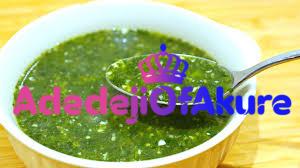Ewedu refers to a type of leafy green vegetable that is popular in West African cuisine, particularly in countries like Nigeria. Its scientific name is Corchorus olitorius, and it is known by various names in different regions, such as “jute mallow,” “jute leaf,” or “lalo.”
Appearance
Ewedu leaves are dark green and have a slightly slimy or mucilaginous texture when cooked. The leaves are typically long and narrow, and the plant can grow up to 3 meters in height.

Culinary Use
Ewedu is commonly used in soups and stews, especially in Nigerian cuisine. It is a key ingredient in a popular Nigerian soup called “Ewedu Soup” or “Molokhia Soup.” The leaves are often boiled, blended, and then added to soups for their unique flavor and texture.

Nutrition
Ewedu is considered nutritious and is a good source of vitamins and minerals, including vitamin C, vitamin A, calcium, and iron. It is also rich in dietary fiber.
Flavor
Ewedu leaves have a mild, slightly nutty flavor with a hint of bitterness. The mucilaginous texture contributes to the overall mouthfeel of dishes.
Health Benefits
- Nutrient-Rich: Ewedu is a good source of essential nutrients, including vitamins and minerals such as vitamin C, vitamin A, calcium, iron, and potassium. These nutrients are important for overall health and well-being.
- Dietary Fiber: Ewedu is rich in dietary fiber, which can aid in digestion and help regulate bowel movements. Adequate fiber intake is also associated with a reduced risk of certain digestive problems and can help maintain a healthy weight.
- Antioxidants: It contains antioxidants like vitamin C and beta-carotene, which can help protect cells from damage caused by free radicals. Antioxidants may play a role in reducing the risk of chronic diseases.
- Immune Support: Vitamin C, present in ewedu, is known for its immune-boosting properties. It helps the body produce white blood cells and supports the immune system’s function.
- Eye Health: The beta-carotene in ewedu is a precursor to vitamin A, which is essential for maintaining good vision and eye health. A diet rich in beta-carotene may lower the risk of age-related macular degeneration.
- Bone Health: Ewedu contains calcium, which is important for maintaining strong and healthy bones. Consuming foods rich in calcium can contribute to bone density and reduce the risk of osteoporosis.
- Iron Content: Iron is essential for the formation of red blood cells and the transportation of oxygen throughout the body. Ewedu’s iron content can be beneficial for individuals with iron-deficiency anemia.
- Digestive Comfort: Ewedu has a slightly slimy or mucilaginous texture when cooked. This mucilage may have soothing properties for the digestive tract and can help alleviate discomfort associated with certain gastrointestinal issues.
- Weight Management: The dietary fiber in ewedu can help promote feelings of fullness and satiety, potentially aiding in weight management by reducing overeating.
- Hydration: The mucilage in ewedu leaves can help with hydration, especially in dishes where the slimy texture is retained. This can be particularly beneficial in hot climates.
Preparation
To prepare ewedu for cooking, the leaves are typically cleaned, chopped, and boiled until tender. Some recipes call for blending the cooked leaves into a smooth, slimy consistency. It is often served with starchy accompaniments like amala (yam flour), eba (cassava dough), or pounded yam.
Cultural Significance
Ewedu is an integral part of Nigerian and West African culinary traditions. It is served at various occasions, including celebrations and everyday meals. The method of preparation and the choice of accompanying dishes can vary by region and personal preference.
Availability
Ewedu leaves can be found in local markets and grocery stores in regions where West African foods are prevalent. They are typically sold fresh or frozen.
Varieties
There are different varieties of jute leaves, and the specific type of ewedu used in dishes may vary based on regional availability.
Furthermore, it’s important to note that while ewedu offers these potential health benefits, its overall impact on health is best realized when part of a balanced diet that includes a variety of foods.
Additionally, individual health outcomes may vary, and dietary preferences and needs differ among individuals. Ewedu is a versatile ingredient in West African cooking and is enjoyed for its unique flavor and texture.
Finally, it’s not only delicious but also provides valuable nutrition, making it a staple in many traditional dishes. If you have access to ewedu leaves and are interested in trying West African cuisine, you can explore various recipes that feature this nutritious green vegetable.










